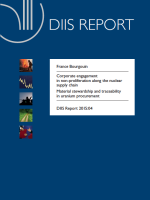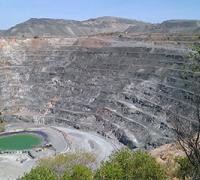Governing uranium and corporate security
Nuclear value chains are globally dispersed and largely opaque to the general public and other stakeholders. At the national level, regulatory frameworks can be robust, particularly on issues of safety which in practice can provide a form of industry engagement on non-proliferation. Nevertheless, two significant changes in the global economy of nuclear material have taken place over the past two decades which should be considered when looking at the relevance of non-proliferation for companies along the nuclear value chain: 1) the globalisation of supply chains and growing need for nuclear energy from emerging economies (notably China, Brazil, India, South Africa) and; 2) an opening of uranium supply from regulated markets to states with relatively weak governance and little regulation (e.g. Malawi, Tanzania). Together, these dynamics bring into question the strength of the current nuclear governance regime and potentially place additional responsibility on multinational companies mining uranium in these areas.
Companies operating in these countries have by and large not identified non-proliferation as a material issue to their risk portfolio. Rather, the issue is seen as being the remit of states and companies pledge their compliance to currently existing regulatory structures. This report, the latest in theGoverning Uraniumseries, presents an overview of current corporate engagement on the issue of non-proliferation for three key sectors within the nuclear supply chain: uranium mining, civilian nuclear power, and finance.
A key finding of the report is that current structures addressing specified sustainability risks are in place and could be elaborated to include non-proliferation. For example, current corporate practices, the uranium market structure, the criteria for financing uranium mining projects and the stable long-term nature of supply contracts all contribute to best practice. However, these are not interpreted as corporate engagement in non-proliferation. Rather they are seen as material stewardship, due diligence, risk mitigation, and good business practice. In other words, just as a robust non-proliferation regulation framework needs to address both the front and the back end of the fuel cycle adequately, global corporate sustainability infrastructure needs to be expanded to include non-proliferation both upstream and downstream along the nuclear value-chain. As the geographies of uranium trade are expanding, increasing transparency and incorporating non-proliferation into wider corporate sustainability debates become all the more relevant to industry’s quest to uphold ethically, socially and environmentally responsible practices in the nuclear supply-chain.


